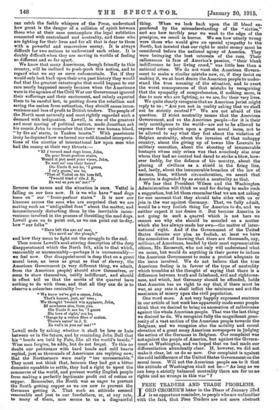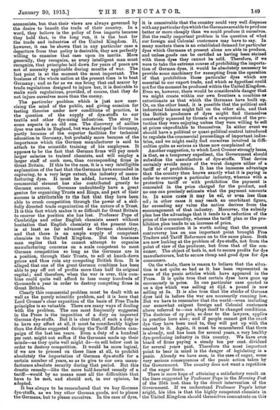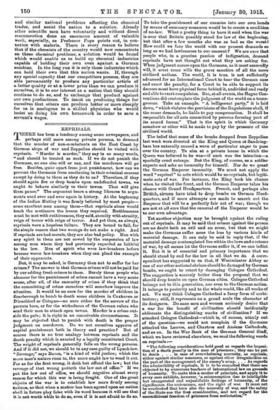FREE TRADERS AND TRADE PROBLEMS.
LORD CROMER'S letter in the Times of January 23rd is an opportune reminder, to people who are unfamiliar with the fact, that Free Traders are not mere abstract economists, but that their views are always governed by the desire to benefit the trade of their country. In a word, they believe in the policy of free imports because they hold that, in the long run, it is the best for the trade and industries of the United Kingdom. If, however, it can be shown that in any particular case a departure from that policy is desirable, they are perfectly willing to examine that case upon its merits. More generally, they recognize, as every intelligent man must recognize, that principles laid down for years of peace are not of necessity applicable during months of war. The last point is at the moment the most important. The business of the whole nation at the present time is to beat Germany ; and so far as we can bring that end nearer by trade regulations designed to injure her, it is desirable to make such regulations, provided, of course, that they do not injure ourselves more than the enemy,
The particular problem which is just now exer- cising the mind of the public, and giving occasion for testing theories under now conditions of practice, is the question of the supply of dye-stuffs to our textile and other dye-using industries. The story in some aspects is an old one. The discovery of aniline dyes was made in England, but was developed in Germany, partly because of the superior facilities for technical education in Germany, but probably more because of the importance which the German manufacturer is said to attach to the scientific training of his employees. It appears to be the fact that German firms will pay much larger salaries to trained chemists, and will employ a larger staff of such men, than corresponding firms in Great Britain. If this be the case, it is a very intelligible explanation of the fact that the Germane have succeeded in capturing, to a very large extent, the industry of manu- facturing dyes. It must be added, however, that the commercial element has also contributed greatly to German success. Germane undoubtedly have a great genius for organizing Trusts and Rings, and part of their success is attributable to the fact that they have been able to crush competition through the power of a skil- fully directed trade organization of the nature of a Trust. It is this fact which makes it so difficult for Great Britain to recover the position she has lost. Professor Pope of Cambridge and other English chemists assert without hesitation that English chemistry at the present time is at least as far advanced as German chemistry, and that there is an ample supply of competent chemists in the United Kingdom. But the business man replies that he cannot attempt to organize manufacturing concerns on a scale competent to meet German competition so long as the Germans are in a position, through their Trusts, to sell at knock-down prices and thus ruin any competing British firm. It is alleged that one of the great German combines has been able to pay off out of profits more than half its original capital; and therefore, when the war is over, this com- bine could quite well afford to lose many hundreds of thousands a year in order to destroy competing firm. in Great Britain.
Clearly this commercial problem must be dealt with as well as the purely scientific problem, and it is here that Lord Cromer's clear exposition of the basis of Free Trade principles is so valuable. There are many ways of dealing with the problem. The one most frequently suggested in the Press is the imposition of a duty on imported German dye-stuffs. But it is clear that, if such a duty is to have any effect at all, it must be considerably higher than the duties suggested during the Tariff Reform cam- paign of the last ten years. Even a duty of a hundred per cent. might not suffice if the Germans made up their minds—as they quite well might do—to sell below cost in order to destroy competition. It would be more logical, if we are to proceed on these lines at all, to prohibit absolutely the importation of German dye-stuffs for a certain number of years, so as to give to our own manu- facturers absolute security during that period. But this drastic remedy—like the more half-hearted remedy of a tariff—would by no means meet all the difficulties that have to be met, and should not, in our opinion, be adopted.
It has always to be remembered that we buy German dye-stuffs, as we buy other German goods, not to please the Germans. but to please ourselves. In the case of dyes, the United Kingdom should themselves concentrate on this
it is conceivable that the country could very well dispense with any particular dye which the Germansareable to produce better or more cheaply than we could produce it ourselves. But the really important problem is the question of what our foreign and Colonial customers may have to nay. In many markets there is an established demand for particular dyes which Germans at present alone are able to produce, and unless goods can be certified as having been stained with these dyes they cannot be sold. Therefore, it we were to take the extreme course of prohibiting the importa- tion of German dyes, it would be absolutely necessary to provide some machinery for exempting from the operation of that prohibition those particular dyes which are essential to our export trade, and which ex hypothesi could not for the moment be produced within the lJnitedKingdotn. Even so, however, there would be considerable danger that we might create within our own frontiers a combine as extortionate as that which the Germans have built up. Or, on the other hand, it is possible that the political and industrial balance might fall on the other side, and that the British producers of dyes might find themselves constantly squeezed by threats of a suspension of the pro- tection they were enjoying unless they were willing to sell at prices unprofitable to themselves. In either event we should have a political or quasi-political control introduced to regulate the commercial proceedings of important indus- tries, and we might easily, find ourselves involved in diffi- culties quite as serious as those now complained of. Another suggestion, to which Lord Cromer strongly lean; is that, as a temporary expedient, the Government should subsidize the manufacture of dye-stuffs. That device certainly avoids many of the worst dangers either of • tariff or of prohibition. It has the immense advantage that the country then knows exactly what it is paying in order to encourage a particular industry, whereas with a protective tariff or with prohibition the payment is concealed in the price charged for the product, and no one can precisely estimate what the payment amounts to. In some cases it may be nil, or even less than nil ; in other cases it may reach an exorbitant figure, far exceeding any value the nation derives from the encouragement of that industry. Moreover, the subsidy plan has the advantage that it tends to a reduction of the price of the commodity, whereas the tariff plan or the pro- hibition plan tends to an increase of price.
In this connexion it is worth noting that the present controversy has on one important point brought Free Traders and Tariff Reformers on to the same plane. Both are now looking at the problem of dye-stuffs, not from the point of view of the producer, but from that of the con- sumer. The object of both is, not to secure profits for dye manufacturers, but to secure cheap and good dyes for dye C0113111:118111.
On the whole, there is reason to believe that the situa- tion is not quite so bad as it has been represented in some of the panic articles which have appeared in the Press. It is quite true that certain dyes have gone up enormously in price. In one particular case quoted to us a dye which was selling at 60. a pound is now selling at 5e. It is also true that the stocks of Gorman dyes laid in before the war are necessarily running low. But we have to remember that the world—even including our somewhat exigent foreign and Colonial customers above referred to—can adapt itself to changed conditions. The doctrine of cy pre:, so dear to the lawyers, applies in practice here also ; and if people cannot get the exact dye they have been used to, they will put up with the nearest to it. Again, it must be remembered that there is already, and has been for several years, a very healthy dye-producing industry in this country. We have even heard of firms paying a steady ten per cent, dividend for several years past. Therefore the most important point to bear in mind is the danger of legislating in a panic. Already we have seen, in the case of sugar, some very serious consequences of the panic action taken by the Government. The country does not want a repetition of the sugar fiasco. There is more hope of attaining a satisfactory result on the lines suggested by Professor Pope in the Morning Post
of the 25th inst. than by the direct intervention of the Government. If we understand Professor Pope's letter aright, his idea is that the highly competent chemists in
and similar national problems affecting the chemical trades, and assist the nation to a solution. Already other scientific men have voluntarily said without direct remuneration done an enormous amount of valuable work, especially, as Professor Pope points out, in con- nexion with malaria. There is every reason to believe that if the chemists of the country would now concentrate on these chemical problems, a solution would be found which would enable us to build up chemical industries capable of holding their own even against a German combine. In the long run it is only those industries which can bold their own that this nation wants. If, through any special capacity that our competitors possess, they are able permanently to produce any particular article of a better quality or at a lower price than we can produce it ourselves, it is to our interest as a nation that they should continue to do so, and to exchange that product against our own productions. To insist on producing things for ourselves that others can produce better or more cheaply for us is analogous to a skilled physician who would insist on doing his own housework in order to save a servant's wages.




















































 Previous page
Previous page